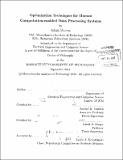Optimization techniques for human computation-enabled data processing systems
Author(s)
Marcus, Adam, Ph. D. Massachusetts Institute of Technology
DownloadFull printable version (15.47Mb)
Other Contributors
Massachusetts Institute of Technology. Department of Electrical Engineering and Computer Science.
Advisor
Samuel R. Madden and David R. Karger.
Terms of use
Metadata
Show full item recordAbstract
Crowdsourced labor markets make it possible to recruit large numbers of people to complete small tasks that are difficult to automate on computers. These marketplaces are increasingly widely used, with projections of over $1 billion being transferred between crowd employers and crowd workers by the end of 2012. While crowdsourcing enables forms of computation that artificial intelligence has not yet achieved, it also presents crowd workflow designers with a series of challenges including describing tasks, pricing tasks, identifying and rewarding worker quality, dealing with incorrect responses, and integrating human computation into traditional programming frameworks. In this dissertation, we explore the systems-building, operator design, and optimization challenges involved in building a crowd-powered workflow management system. We describe a system called Qurk that utilizes techniques from databases such as declarative workflow definition, high-latency workflow execution, and query optimization to aid crowd-powered workflow developers. We study how crowdsourcing can enhance the capabilities of traditional databases by evaluating how to implement basic database operators such as sorts and joins on datasets that could not have been processed using traditional computation frameworks. Finally, we explore the symbiotic relationship between the crowd and query optimization, enlisting crowd workers to perform selectivity estimation, a key component in optimizing complex crowd-powered workflows.
Description
Thesis (Ph. D.)--Massachusetts Institute of Technology, Dept. of Electrical Engineering and Computer Science, 2012. Cataloged from PDF version of thesis. Includes bibliographical references (p. 119-124).
Date issued
2012Department
Massachusetts Institute of Technology. Department of Electrical Engineering and Computer SciencePublisher
Massachusetts Institute of Technology
Keywords
Electrical Engineering and Computer Science.